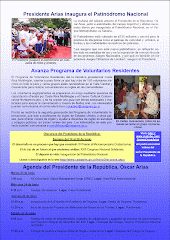Dear CR Volunteers,
Hi, I am first time blogger, so maybe you can all educate me about the process. I do have a degree in investigative news reporting and have written over 500 articles, some published nationally in the U.S. I even won the Rolling Stone Magazine College Journalism award for Investigative News Reporting in 1975. I live here permanently in Costa Rica, my wife is from Guanacaste and we have two children. I am a semi-retired private investigator and still have an office in San Francisco, California. Enough about me, I want to hear about you and your lives here in Costa Rica.
Friday, May 29, 2009
Subscribe to:
Post Comments (Atom)
Blog Archive
Article in Weekly Bulletin of Casa Presidencial

We're making news!

After graduating from a private university in Mexico, I immigrated to Costa Rica where I worked as a translator and attended the University of Costa Rica. I returned to the US for a Ph.D in linguistics and then came back to Costa Rica, where I have been teaching first in the UNA and then in the Department of Linguistics in the UCR for 36 years. For four years I worked as the head of the translation department of an international NGO and have also worked as a translation consultant for indigenous and creole language projects, a job which has taken me all over Latin American and the Caribbean. I have three grown children, all born and reared in Costa Rica and all of whom live here (two still with me).
ReplyDeleteRon,
ReplyDeleteWell, you are quite a resource when we come up with some of the eccentricities in language, especially Spanish. I am always amazed at the number of words that exist in one language and not another. Could be an interesting post, all of the English words that don't have a specific translation, i.e. "shallow" - translates as "no es profundo" or maybe there is a word, but I have never heard it. Interesting language tip of the day - I learned modern Hebrew in 1974, which is different than the religious Hebrew at the synagogue. There was a huge argument in Israel, in the beginning of the 20th Century, as to which would be the official language, a toss-up between Hebrew and Yiddish, which was more commonly spoken by the original settlers, but Hebrew won out. Problem - no functional dictionary, which was then written by Eliezer Ben Yehuda. The result is that modern Hebrew is very standardized and not a very difficult language to learn. There is a good reason for this, the country needed to integrate 90 different cultures into one homogenious group, thus they set up "Ulpans" or language school all over the country. My classmates were, believe it or not, Mexicans, Russians, Moroccans, and Algerians. I learned Spanish at the same time and a bit of Arabic.
Seth,
ReplyDeleteYour experiences in Israel sound tremendously interesting. I have long wanted to go there, but never have.
Your remarks about words that exist in one language but not another are very perceptive. Truth be told, when we compare the lexicons of different languages (even related ones) we find that many of their words have a certain degree of overlap, but very few share the exact same semantic territory. Once you get past words such as oxygen and pacemaker, the correspondence becomes pretty tenuous.
Regarding the apparent lack of a Spanish word for "shallow", when talking about liquids such as water one can say "El agua era poco profunda". When talking about arguments, people, etc., "superficial" or "banal" often fill the bill.